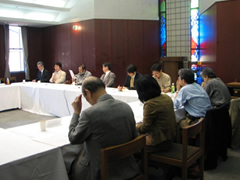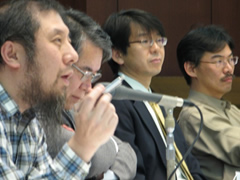Center for Interdisciplinary Study of Monotheistic Religions(CISMOR)Doshisha University
> Past Research Activities > The human Rights and Freedom of Speech in IslamPast Research Activities
Study Meeting #1, 2009
The human Rights and Freedom of Speech in Islam
| Date: |
2009/05/23 13:00 - 17:30 |
|---|---|
| Place: | Conference Room E, Neesima Kaikan |
| Speaker: |
|
| Commentator: |
|
| Summary: | |
|
Today there were two presentations on the theme of “Human Rights and Freedom of Speech in Islam.” Taking up the discourse of modern Islamic scholar Ayatollah Abdollah Javadi-Amoli, Tomita compared concepts such as human rights and freedom between Iran’s Shiite world and the modern West. Nakata explained religion, faith, and freedom of speech from the perspective of Islam while also addressing the distinctiveness of Western concepts such as “the separation of church and state” and “the division between the religious and the secular.” Tomita’s report focuses on clarifying the argument of Ayatollah Abdollah Javadi-Amoli as a representative of contemporary Iran. He argues that the “(view of the) human” is an important premise for “human rights,” but the human is composed of the physical and the soul, or spirit. Of these two, the essence of the human, or the spirit, should be given priority. Further, he says freedom is defined as “freedom from subservience to anything but God.” He believes that the contemporary Western understanding of freedom, which permits a choice even about this very subservience, threatens the moral foundations of humanity. Adding to these differences between Islam and the modern West, Tomita points out that, in the West, each civil right is not entrusted to the government or the nation, but rather to each person, who maintains them and works toward guarantees that they will not be violated by the government or nation (“the social contract”). In Islam, however, the maintenance of each right is ceded to the leader. Nakata’s report focused on the division of systems, particularly the division of politics and religion, which has gained much attention. Nakata believes that ideas derived from the West, such as “the separation of church and state” and “the division between the religious and the secular,” are extremely idiosyncratic. He explained the impossibility of exporting and arguing about these concepts in the Islamic world view. Specifically, he pointed to the fact that while modern Western culture inherited the tradition of centralized bureaucratic institutions from the Roman Empire and the Catholic Church, modern Islamic culture did not. In Islam, the term that roughly corresponds to “secular” is “material world,” but the antonyms of these terms, “the spiritual” and “the afterlife,” respectively, have no conceptual overlap. Further, Nakata raised the point that the separation between church and state, which focuses on the separation of the political system and the religious system, does not exist in Islam, and that modern Western culture’s concept of “freedom of religion, faith, and speech,” which implies “freedom from politics,” was not raised as an issue in Islam in the first place. These two reports focused on how human beings’ various freedoms in a secular world that is rooted in a religious world view are determined at the line that separates this place from the afterlife. Prof. Hama, who served as commentator, and Prof. Takaki shared their opinions on various points. In particular, a question about the legal provisions of human rights and freedom of speech was carried over into the subsequent open discussion, leading to a fascinating conversation. Ken'ichiro TAKAO (Graduate Student of School of Theology, Doshisha University) |
|

